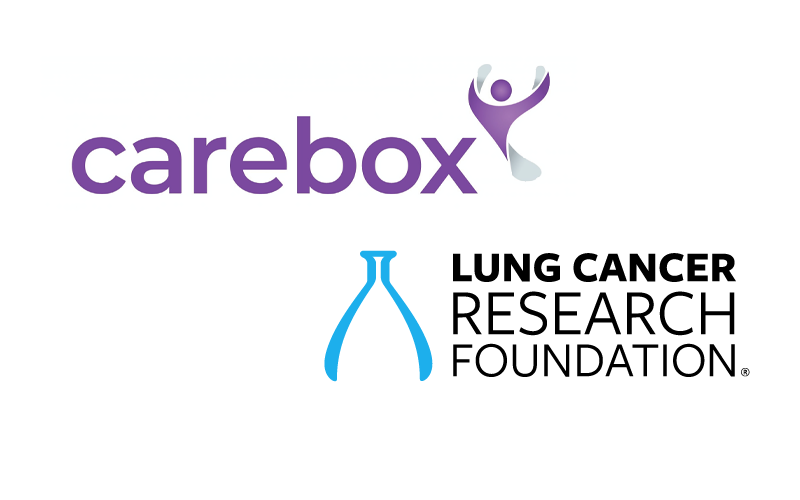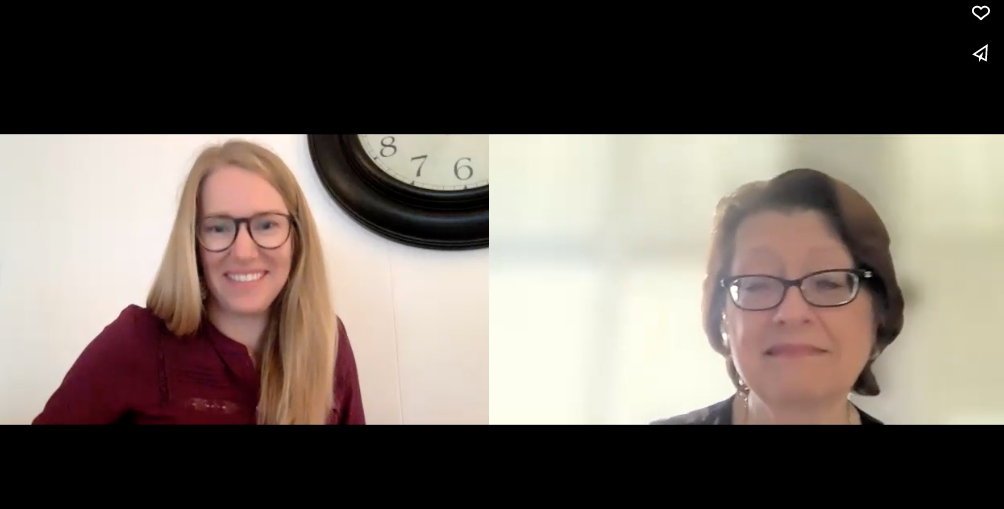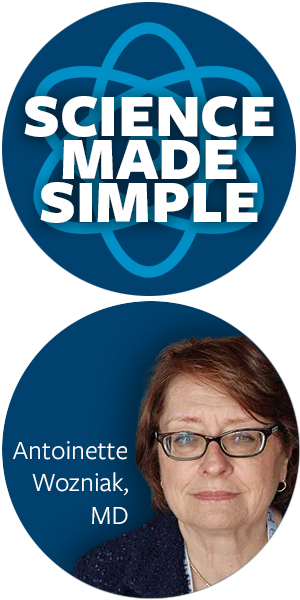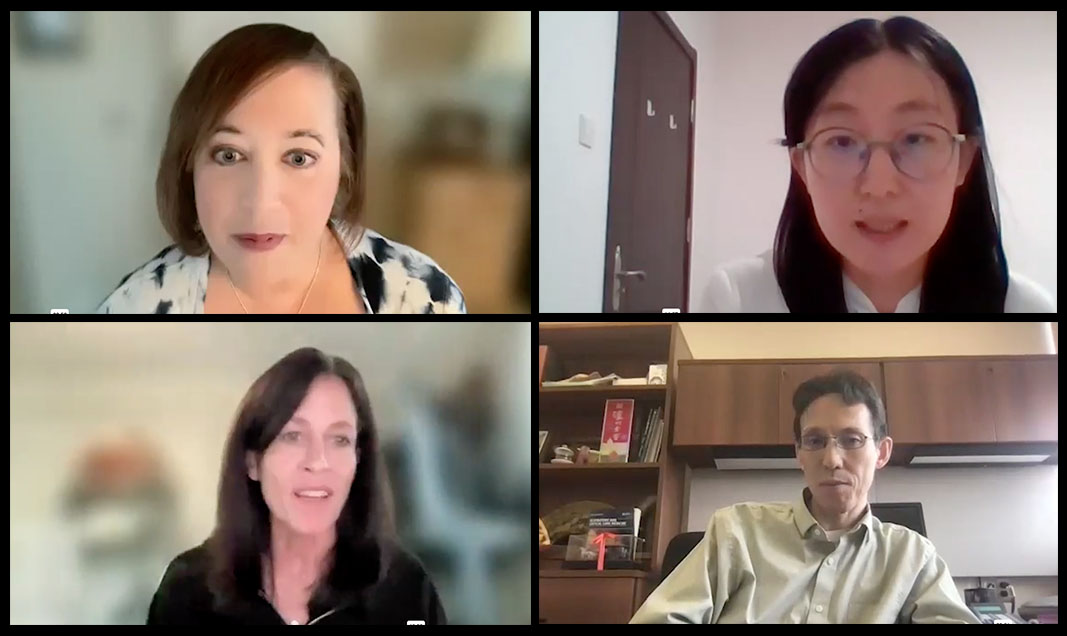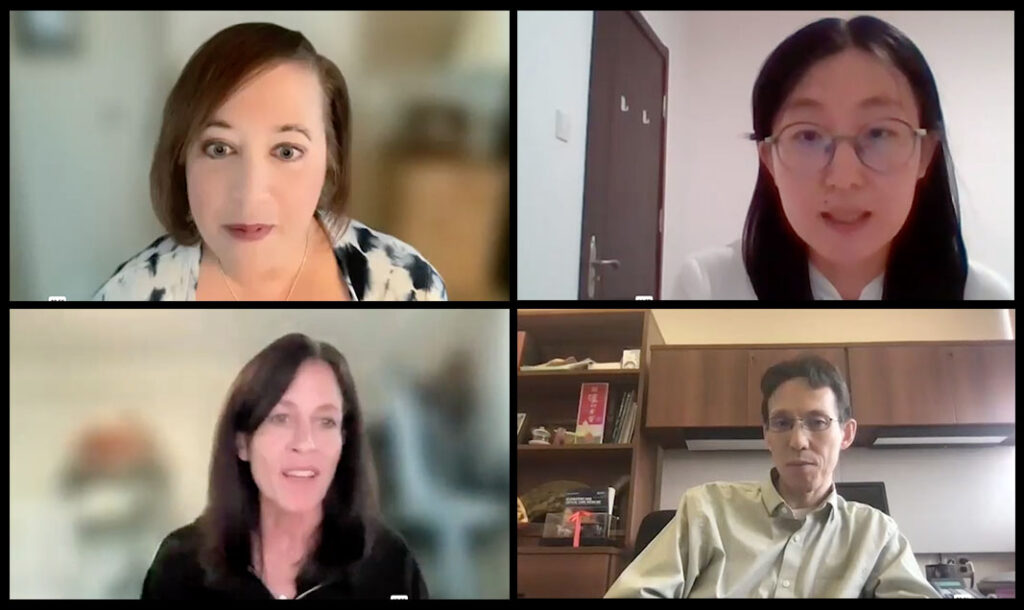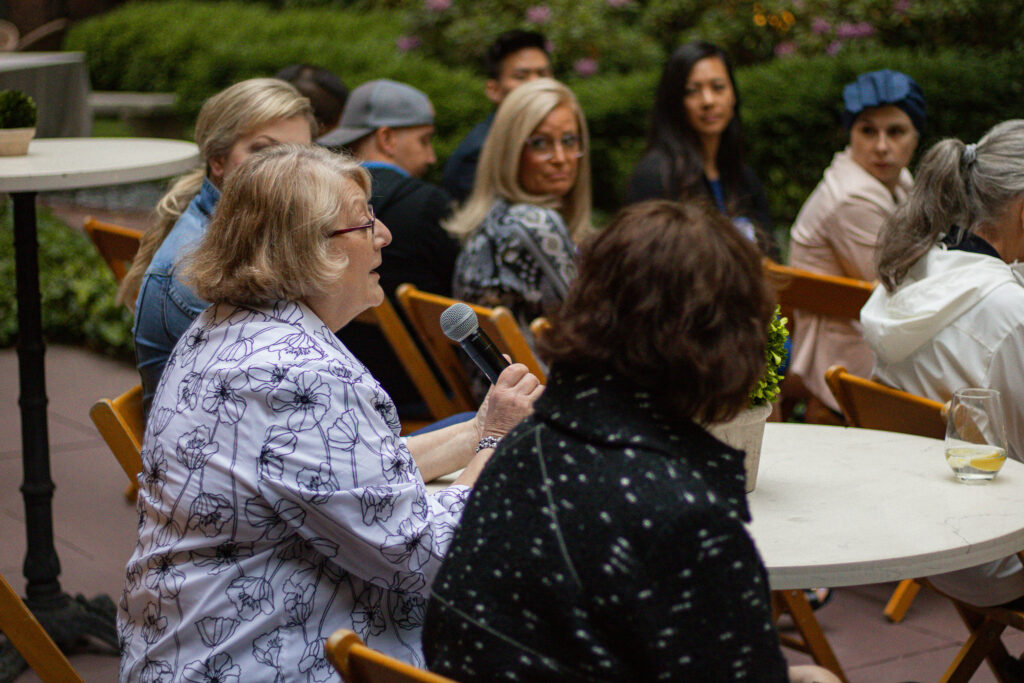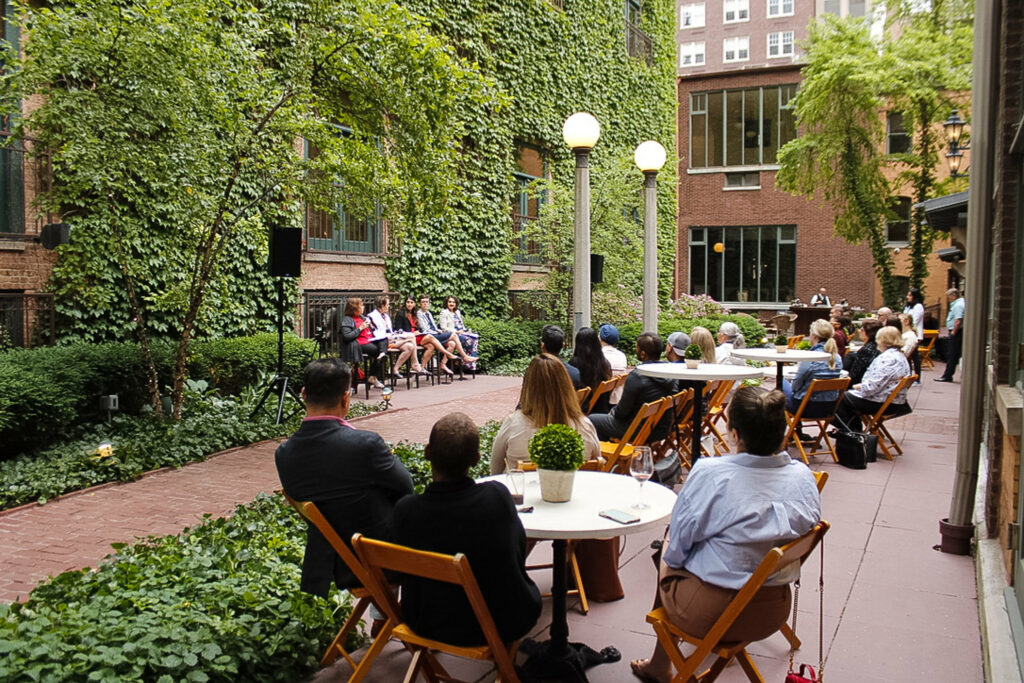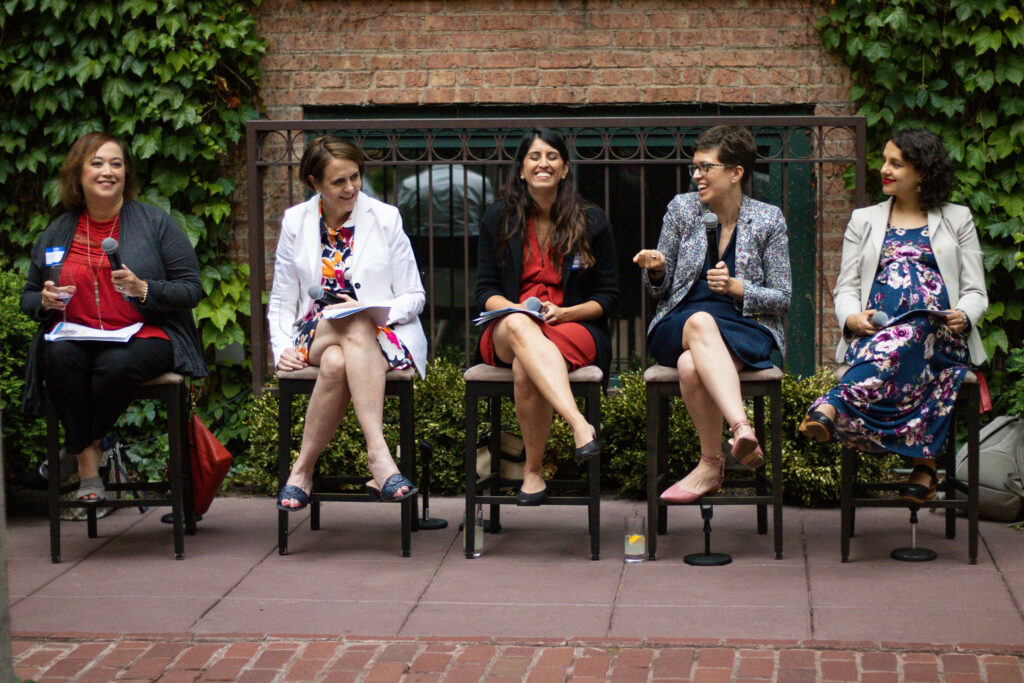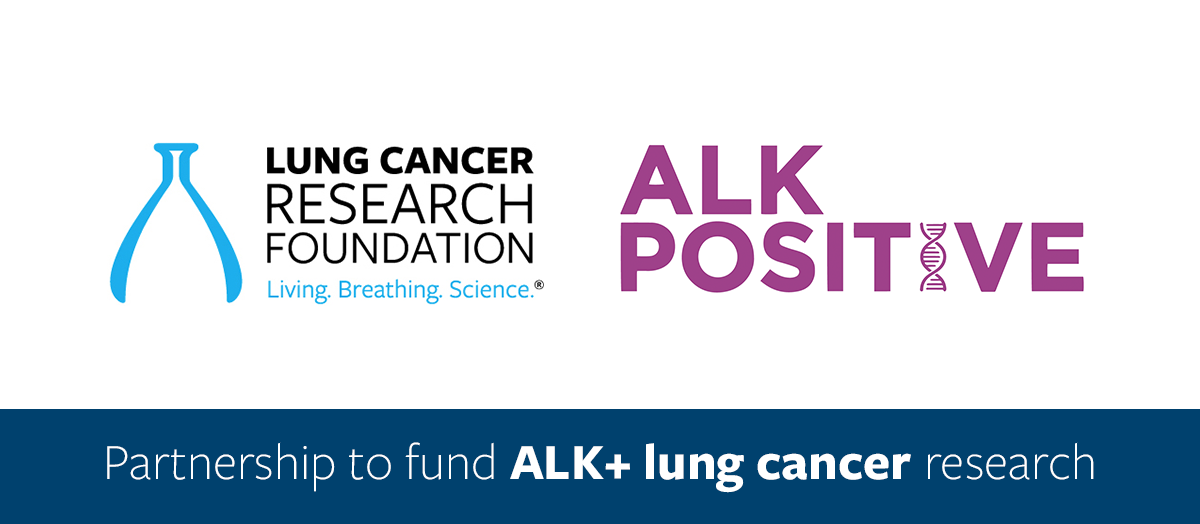LCRF’s new Executive Director, Aubrey Rhodes and Chief Scientific Officer Dr. Antoinette (Toni) Wozniak talk about some of the work being done by LCRF grantees and the status of this year’s application process. Watch a video excerpt; a transcript of their full conversation is also available below.
Ms. Rhodes:
Hi, everyone, I’m Aubrey Rhodes. I’m the newly appointed executive director for the Lung Cancer Research Foundation, and happy to be serving in this role. I’ve actually been with the organization for the last seven years, working on some of the strategy and fundraising. So looking forward to continuing our success. And speaking of success, there have been quite a few updates from some of the research that we have funded right here at LCRF, thanks to all of you. So I thought I would bring our Chief Scientific officer, Dr. Toni Wozniak, to join us and talk a little bit about some of those updates from Dr. Hideko Isozaki and Dr. Mariam Jamal-Hanjani.
Dr. Wozniak:
Hi. I’m really glad to be here and to tell you about some of the exciting research that we have funded from LCRF. Dr. Isozaki is at Dana-Farber and she’s interested in what we call persister cells. And these are cancer cells that persist after treatment with targeted therapy. In this case, she’s actually been working with EGFR tumors as well as ALK positive tumors. And what she’s found is that one of the potential mechanisms of resistance is the accumulation of an enzyme called APOBEC. It’s a cytidine deaminase – it’s got a very long name, so I won’t go into it – but its accumulation causes more instability in these cells. They have more mutations, and because they’re unstable, they tend to eventually grow. She’s actually looked at this in real tumor tissue from patients both before treatment with targeted therapy and afterwards. She and her team are also looking at a way to target these abnormalities. The goal is to overcome resistance, and this is one way of potentially doing it. So that’s pretty exciting because if successful, it could help patients live longer.
Ms. Rhodes:
That is exciting, Toni! I mean, if we can figure out resistance, that means patients would be able to stay on their treatments longer. That’s the ideal, right? We don’t want to deal with resistance as an issue – and this could help us figure out more about it so that we don’t have those challenges.
Dr. Wozniak:
The goal is always ultimately a cure, but if we can sort of inch toward there with overcoming these resistance patterns, patients certainly can live longer, and who knows, maybe potentially be cured. The second researcher, is actually in London – Dr. Jamal-Hanjani. We funded her through our Minority Career Development Award. And her research is really very interesting. It sort of centers around why patients who never smoked get lung cancer. They’ve done a very large study and looked at the rates of a certain type of pollution. The particles from the pollution are 2.5 microns or smaller, and they can actually get into the lung and cause a lot of inflammation. What they have found out is that in areas with this particular type of pollution, there seem to be more lung cancer in patients who never smoked. Interestingly, many people who do not have active lung cancer may have some abnormalities already in their natural cells. And in this case, they found out that there may be EGFR mutations. However, these patients actually don’t have lung cancer, and some of them may not get it, but the inflammation from the pollution may activate these mutations and they can get lung cancer. Her research actually has resulted in publication in a very high impact journal: Nature. And it’s caused quite a bit of attention. So this is actually pretty exciting as well.
Ms. Rhodes:
Yeah, it sounds really exciting to learn a little bit more about how we might be able to even detect lung cancer earlier for some potential patients.
Dr. Wozniak:
And maybe even how to prevent it – if we can deal with the pollution.
Ms. Rhodes:
Exactly. Toni, you mentioned ALK positive, and speaking of that particular type of lung cancer, we recently just formed a partnership with the ALK Positive patient advocacy group. Well, we actually evolved a partnership, I should say – we’ve had a partnership for quite some time. But we really took a step in the next direction in terms of the research that we want to fund. We just recently released a new RFP – a request for research proposals – in the ALK positive space that will be a $2 million award, one of the single largest awards we’ve given as an organization. Could you talk a little bit about the projects that we are hoping to fund?
Dr. Wozniak:
Well, we’ve been funding – as you said, Aubrey – ALK positive research for quite some time. But to really make an bigger impact, we feel that we need to move into larger grants. And that’s what this grant hopefully will be. It’ll be a larger grant, $2 million over three years toward research for ALK positive patients. And the whole idea is that we come up with something innovative because these patients have done extraordinarily well with current treatments, but they’re not cured, and we have to move toward that. So the goal is to have a novel clinical trial associated with the grant; in fact, it has to be associated with the grant. The grant can have a funding partner, for instance, the pharmaceutical company that’s supporting the clinical trial. The goal of the grant is to try to understand ALK positive lung cancer, why it becomes resistant, and how to overcome resistance with whatever clinical trials associated with it. So there’s going to be a lot of translational work. It could include more than one project, but ultimately they’ll be integrated. And the goal is to make further advancements in the treatment of ALK positive lung cancer.
Ms. Rhodes:
Yeah. You know, focusing in this specific area in the translational and clinical space will certainly bring those treatment options to patients sooner. So that’s really exciting to hear as well. One other thing that you know is exciting that’s happening right now – we’re currently in the process of reviewing hundreds of grant applications that have been coming in over the last several months. Toni, I know that you’ve had a chance to review many of these applications. Maybe you can talk a little bit about what you’re seeing and any of your excitement around those projects.
Dr. Wozniak:
I got to review a number of what we call letters of intent. And this is the first step in many of the applications we have for grant tracks: leading edge, which would talk about potentially novel treatments or new ideas, overcoming resistance, early detection, and the Minority Career Development Awards. And we had a lot of interest; got a lot of LOIs. Unfortunately, I wish we could fund everybody, but we can’t. Out of the letters of intent, we select probably around 15 to 20% of them to ask the researchers to submit a full proposal. Then we review those. And we just recently did that. Again, there were some exciting ideas. There was some interest in looking at what I mentioned before, these persister cells and mechanisms of resistance and EGFR.
There were some applications in small cell lung cancer, which we’re very happy to see because that is a disease that is a bit of an orphan disease with not a lot of progress. So I’m hoping that these applications will make some progress in that disease. There were several applications looking at immunotherapy and different ways of improving outcomes with immunotherapy by looking at different targets. So there were a number of different proposals, all very exciting. And as I said, we can only fund so many, and I wish we could fund more of them.
Ms. Rhodes:
Well, it’s exciting to hear you talk about the different sorts of projects, that we could potentially fund. I think the big part there is that we need to be able to raise those funds in order to do so, right? And so we actually have a couple of upcoming events that you can participate in to help us raise those dollars to fund those researchers and hopefully fund even more science. We’ve got the Evening of Innovation gala taking place on September 26. Tickets just recently became available, so if you will be in the New York City area or would like to travel to be with us at the Metropolitan Club that evening, we certainly would love for you to join. We also will be kicking off our Free to Breathe Walk to celebrate World Lung Cancer Day. We’ll be fundraising up until the end of the year. But the Free to Breathe Walk weekend will take place over September 30 to October 1. So we hope that you will join us. I would also just say this is a really great opportunity to really honor a loved one who’s received a diagnosis, or has passed from lung cancer. It’s a great way to rally around them and honor their legacy. And so I would encourage you to join us.
Dr. Wozniak:
I also want to mention, Aubrey, that we have a lot of plans for the future, and our success depends on these grants that we’re planning, whether we can fund them because I am sure that they’re going to make a bigger impact.
Ms. Rhodes:
I completely agree with you, Toni. I think we’ve got big plans and a big vision that the Scientific Advisory Board has been working on. And it will certainly require additional funding to continue to move forward. But it’s necessary if we’re going to make a real dent in progress.


